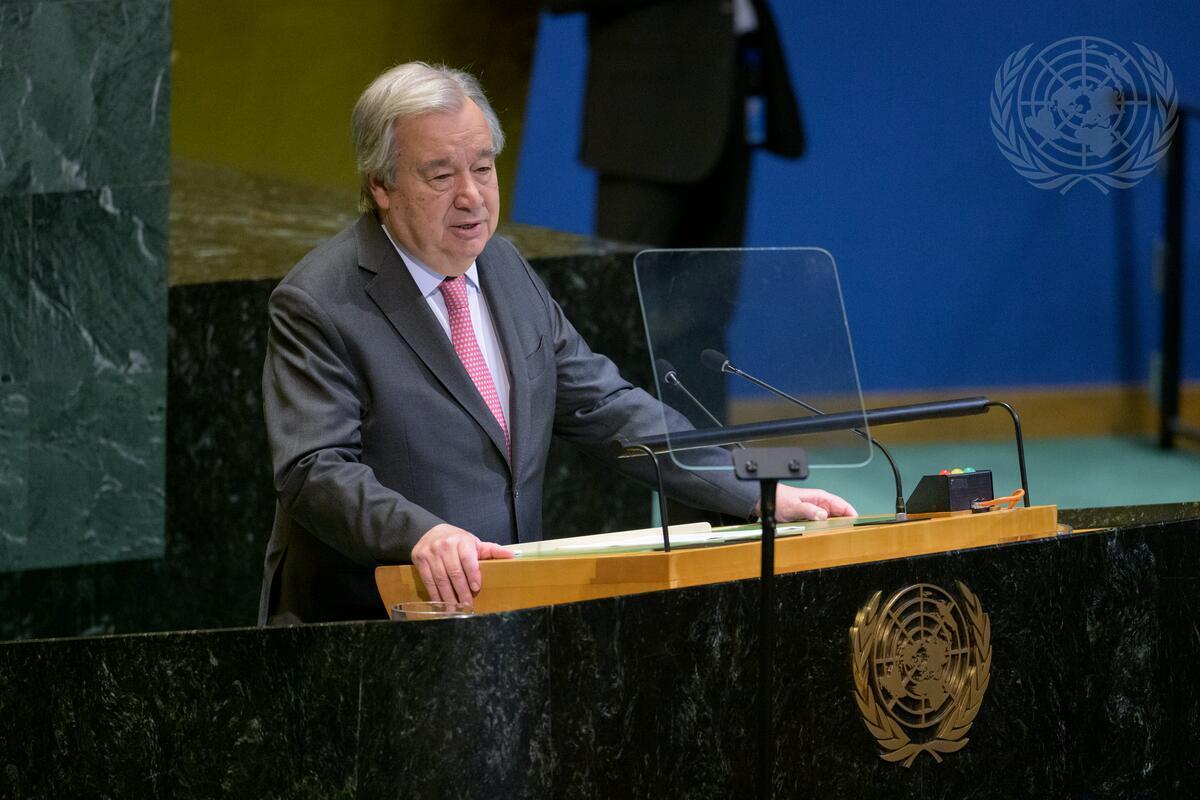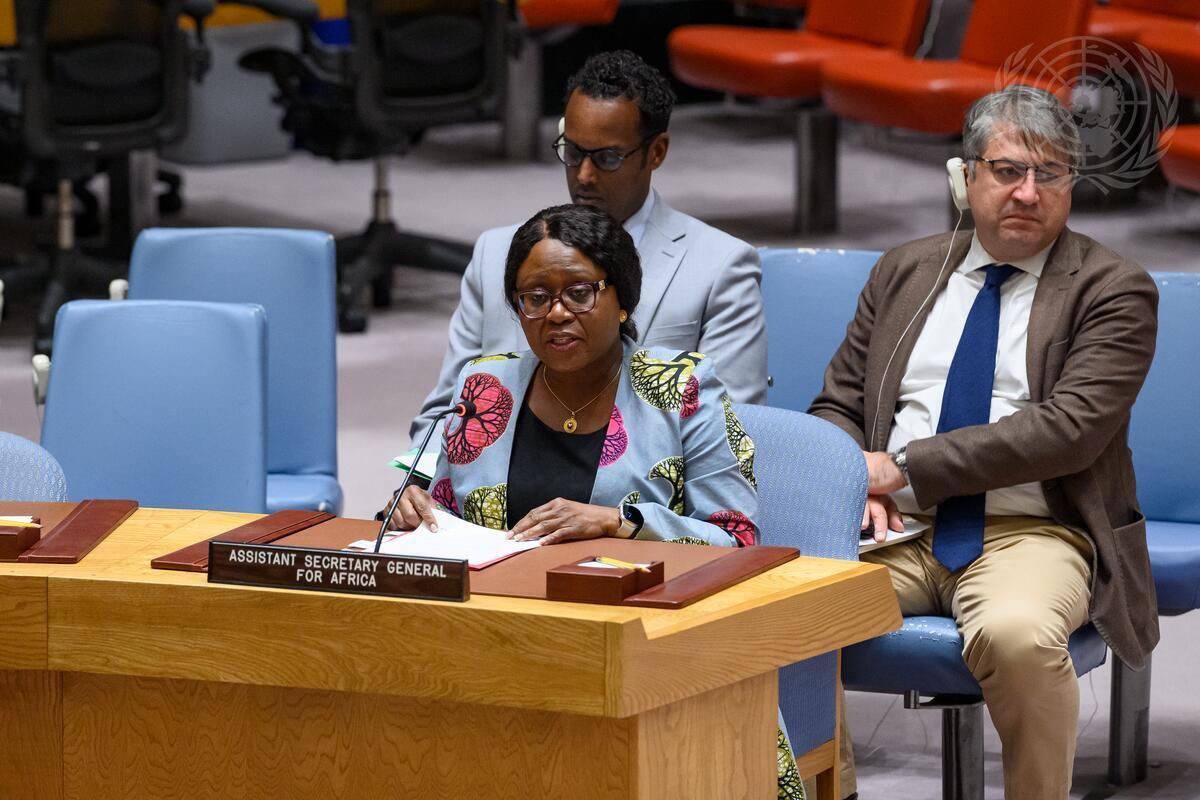Mr. President, Members of the Security Council,
I am grateful for the opportunity to brief you again on the situation in Sudan.
In the last six weeks, Sudan’s political transition has been undergoing its greatest crisis to date. This crisis is not over yet, but discussions on a way forward have begun.
The military takeover of 25 October and the arrest of Prime Minister Hamdok, senior officials, and political activists, triggered widespread protests and condemnation. At least 44 people were killed and hundreds have been injured as a result of excessive use of force by security forces. This has deepened the crisis and mobilized the so-called “street” which continues to organise regular mass demonstrations.
Against this backdrop, I have cautiously welcomed the 21 November political agreement between Prime Minister Hamdok and Lt. General Burhan – which was reached after weeks of domestic and international efforts to find a way out of the crisis. The Agreement is far from perfect but can help to avoid further bloodshed, and provide a step towards comprehensive dialogue and a return to constitutional order.
The Agreement faces significant opposition from a large segment of Sudanese stakeholders, including parties and associations within the Forces for Freedom and Change (FFC), Resistance Committees, civil society organisations and women’s groups. I have met with these and other stakeholders. Many feel betrayed by the coup, and now reject any negotiations or partnership with the military.
The Resistance Committees in particular are determined to continue their protests to reclaim the revolution and push for civilian rule. While the overwhelming majority of protesters remain peaceful, small groups who are using violence have recently appeared.
The military takeover has exposed and deepened the mistrust between the military and civilian components and within the civilian component itself. And the 21 November Agreement has not led to a rebuilding of lost trust. Forthcoming decisions on government formation, high-level appointments, and the establishment of transitional institutions, will test the will and the ability of the stakeholders to seek a common way out of the crisis. In my recent meetings with General Burhan and Prime Minister Hamdok, I have urged that unilateral decisions made in the aftermath of the coup that go against the Constitutional Declaration, are reversed or addressed in ways that rebuild trust among the Sudanese. This includes unilateral appointments by the military leadership.
Among other things, the 21 November Agreement stipulates the formulation of a political declaration which would likely entail constitutional amendments. There are ongoing attempts within and around some political parties and movements to reach an inclusive agreement. Others, other political forces, are open to dialogue but not on the basis of the 21 November Agreement. A lack of inclusivity and consensus could cause further fragmentation. Similarly, while the proposed formation of a technocratic cabinet could be a step towards advancing the transition, it can also create a constitutional challenge if not based on consultations with the Forces for Freedom and Change. These and other decisions are being discussed against the backdrop of an ongoing State of Emergency that General Burhan declared on 25 October.
Excellencies,
Addressing these and other fundamental issues will require dialogue and eventually consensus. We have made clear that UNITAMS is prepared to facilitate an inclusive dialogue, both to address unresolved issues for the transitional period and to deal with broader constitutional questions as part of the constitution-making process. I have been undertaking extensive consultations to determine the scope and modalities of our engagement.
Sudan’s military and political leaders will primarily have to rebuild trust with their own domestic public, particularly with the young generation. Immediate confidence-building measures and a visible commitment to bring the country back on a democratic transition path will be key. Similarly, Sudanese authorities will need to take demonstrable steps to regain financial, economic, and political support from the international community.
Progress in this respect can be measured against a small number of clear and generally acceptable short- and mid-term indicators.
For the immediate term, the main indicator has been the release of all political detainees, cease of arbitrary arrests, and the guarantee of the right to peaceful protest and assembly. Almost all civilians arrested since the coup have now been released, which is a welcome step. Temporary arbitrary arrests are reportedly continuing, particularly during ongoing demonstrations.
Both military and civilian leaders have promised to investigate the use of deadly violence against demonstrators. Accountability for human rights violations perpetrated since 25 October will therefore be seen as a critical indicator for progress and it could help to rebuild confidence.
Three important short-term indicators will be the ability of the Prime Minister to freely form his technocratic cabinet according to the provisions of the Constitutional Document, the lifting of the state of emergency, and the restoration of the freedom of the press.
Over the next few months, the main indicator for a return to a democratic transition path will be the restoration of political space. This is particularly important in light of the professed goal by political and military leaders to hold free and fair elections possibly even earlier than originally planned. The authorities will need to ensure a conducive atmosphere for credible elections which the United Nations and other international actors can then support. Indicators for such a conducive atmosphere will include an independent electoral commission, an inclusive political parties’ law, the freedom of political parties and movements to organize, campaign, and enjoy access to the media, and the guarantee of human rights.
Recent events have also underlined the lack of functioning justice institutions, and the gap they leave in addressing and preventing serious human rights violations. Moreover, the Transitional Legislative Council with 40 per cent women, as stipulated in the Constitutional Declaration, has yet to be formed.
I continue to call upon the Sudanese authorities to guarantee the meaningful participation of women in the political process, in the yet-to-be-formed government and in all efforts to bring an end to the current crisis. My team and I regularly meet with women’s groups from across Sudan to hear their political and security concerns. Their message is clear: there can be no going back on the hard-earned gains on women’s rights, and they are asking for the international community’s support in this regard.
We, UNITAMS, will be closely following all these critical indicators and report against them.
Excellencies,
The security situation remains fragile outside of Khartoum. I am deeply concerned by the resurgence of intercommunal conflicts and armed banditry in Darfur, Blue Nile and the Kordofans. The United Nations has received reports of a significant rise in the killing of civilians, destruction of property and displacements, as well as sexual violence against women and girls. In Darfur this year, about eight times as many people have been displaced than last year. The persistent insecurity in Darfur underscores the need to prioritize the protection of civilians and swiftly implement the provisions of the Juba Peace Agreement. The formation and deployment of the Joint Security Keeping Forces and the operationalization of the National Plan for the Protection of Civilians should be undertaken without delay. The situation in the East will also remain unstable if a political solution is not found soon.
It is important for Sudanese authorities to fulfill their primary responsibility to protect civilians across its territories irrespective of the political crisis.
Mr. President,
In the aftermath of the coup, the decision by donors to pause international development assistance is having a significant impact on the livelihoods of the Sudanese people and risks rolling back the hard-won achievements of the past two years. Humanitarian activities are ongoing, although some humanitarian services that are provided through government mechanisms, such as health-related services, have been disrupted. UN development activities remain heavily impacted, thereby deepening vulnerability and humanitarian needs. One of the key programmes affected is the Family Support Programme, which was expected to provide cash transfers to over 11 million vulnerable Sudanese.
Sudanese authorities must of course demonstrate their commitment to return to a credible constitutional order in order to regain the trust of the international community to resume international financial assistance.
But at the same time, I would like to urge you and the broader international community to take a balanced approach and not to pause aid for too long and consider the speedy resumption of funding in some areas, particularly support to health services and livelihoods, to ensure that the Sudanese people do not continue to bear the brunt of the political crisis.
Excellencies,
I thank the Council for its sustained support of UNITAMS, which continues to discharge its mandate in the context of the challenges facing Sudan. The main areas of the Mission’s effort remain relevant and, in some cases, have been accelerated. In addition to redoubling our good offices efforts, UNITAMS work on human rights and support to the protection of civilians are even more critical in this volatile period and will be strengthened. The Darfur Permanent Ceasefire mechanism, which is chaired by UNITAMS, has been active throughout this period with the support by the way of both the military component and the armed groups that have signed up to the Juba Peace Agreement.
The UN in Sudan also stands ready to support a credible and inclusive constitutional process and elections once a roadmap for these processes is agreed. Organizing an election in Sudan will be a complex undertaking, and the United Nations looks forward to cooperation and collaboration with international partners. I wish to underline the importance of continued support to the Mission and full realization of its field network to enable our efforts across conflict-affected areas of the country.
Excellencies,
The Sudanese men and women’s unwavering commitment to realize civilian-led democratic governance cannot be overlooked. They have sacrificed immensely to realize their aspirations of freedom, peace and justice enshrined in a civilian-led democratic state. They have remained and they seem to remain steadfast in their resolve.
I would like to take this opportunity to reiterate the continued commitment of UNITAMS to support the Sudanese people to realize these aspirations and to thank this Council for its support to our endeavours.
Merci beaucoup, thank you very much.






